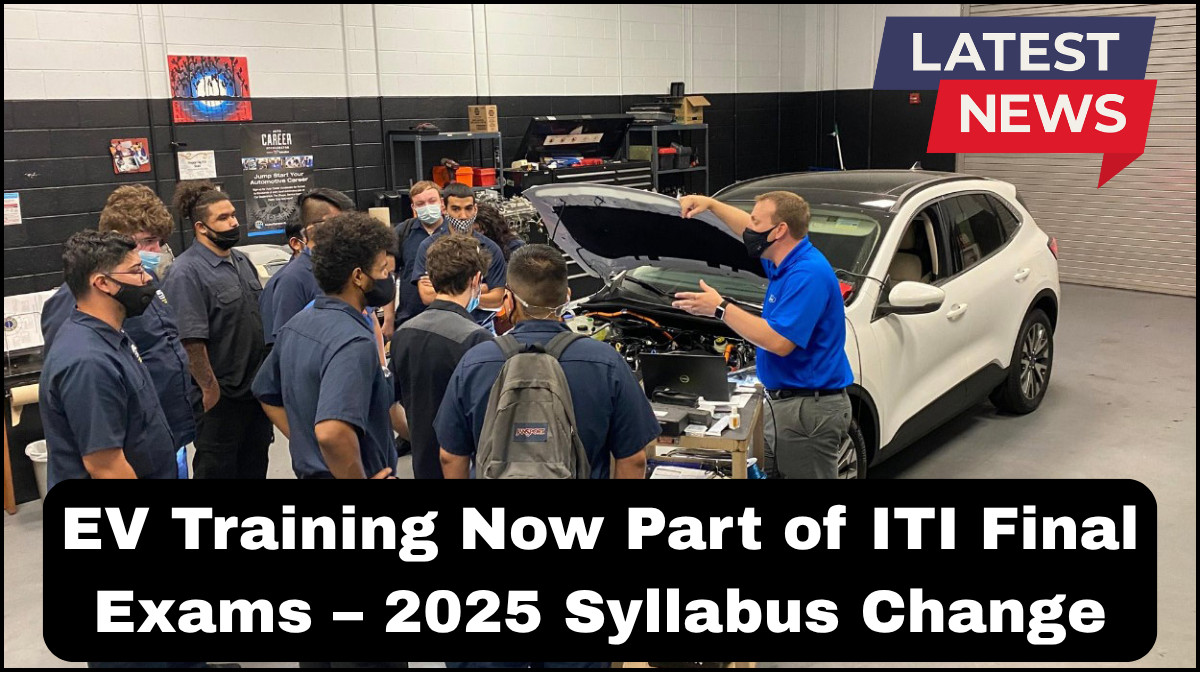In a significant shift aligning vocational education with industry trends, the Ministry of Skill Development and Entrepreneurship (MSDE) has officially introduced EV syllabus in ITI exams 2025. Starting from the upcoming academic year, Industrial Training Institutes (ITIs) across India will include electric vehicle (EV) modules as part of their final examinations. This step is part of a broader effort to modernize technical training and ensure students are prepared for the booming electric mobility sector.

Why This Change Matters
India is undergoing a rapid transformation in its transportation ecosystem. As the government aggressively pushes towards electric mobility to meet climate targets and reduce fossil fuel dependence, the demand for skilled professionals in EV technology is skyrocketing. By integrating electric auto training courses into the ITI curriculum, the government is directly addressing the skills gap in this emerging sector.
ITI graduates have traditionally been a key workforce in the automotive, mechanical, and electrical trades. With EVs requiring a different set of technical skills—from high-voltage battery systems to electric drivetrain maintenance—this curriculum update ensures that students stay relevant and employable in a rapidly evolving job market.
What the New EV Syllabus Covers
The revamped EV syllabus in ITI exams 2025 covers both theoretical and hands-on training modules. Here are some core areas:
- Basics of Electric Vehicles: Understanding how EVs differ from internal combustion engine (ICE) vehicles.
- Battery Technology: Deep dive into lithium-ion battery structure, charging systems, and battery management systems (BMS).
- Electric Powertrain Systems: Study of electric motors, inverters, controllers, and regenerative braking.
- Diagnostics and Maintenance: Training on fault detection, safety protocols, and routine servicing for EVs.
- EV Infrastructure: Learning about charging stations, installation processes, and types of chargers (Level 1, 2, DC fast charging).
- Safety Protocols: Given the high-voltage systems in EVs, safety practices are a vital part of the syllabus.
Impact on Students and Industry
This syllabus change is a win-win for both students and the EV industry. For students, it opens up new career avenues in a high-growth sector. Upon graduation, they will be better positioned to secure jobs in EV manufacturing, maintenance, battery tech, or even renewable energy companies.
For the industry, this development means a growing pipeline of trained professionals ready to hit the ground running. Startups, established automotive companies, and even public sector enterprises will benefit from this newly skilled workforce.
Implementation Timeline and Scope
The revised curriculum will be rolled out from the 2025 academic session. Initially, select ITIs with adequate infrastructure will adopt the full module, while others will implement it in phases. The Directorate General of Training (DGT) is coordinating with automotive companies to facilitate lab setups, internships, and equipment support.
Instructors are undergoing upskilling programs to ensure they are fully equipped to teach the electric auto training course effectively. Digital content, simulators, and real-time training sessions are also being integrated into the learning process.
Support and Collaboration
The successful implementation of the EV syllabus in ITI exams 2025 is also backed by partnerships with industry leaders like Tata Motors, Mahindra Electric, Ather Energy, and Hero Electric. These companies are offering technical inputs, equipment, and even apprenticeships to help shape a job-ready curriculum.
Moreover, initiatives like Skill India and the National Electric Mobility Mission Plan (NEMMP) are acting as umbrella frameworks supporting this educational overhaul.
Frequently Asked Questions (FAQ)
Q1. Why was the EV syllabus added to ITI exams in 2025?
To meet the growing demand for skilled professionals in the electric vehicle sector and ensure that ITI students are ready for future jobs.
Q2. What are the main topics covered in the new EV syllabus?
The syllabus includes EV basics, battery tech, powertrains, diagnostics, maintenance, infrastructure, and safety protocols.
Q3. Will all ITIs adopt the new EV training module?
Initially, only ITIs with sufficient infrastructure will offer the complete EV training program. Others will follow in phases.
Q4. Is the training theoretical or practical?
Both. The course includes classroom learning and hands-on training with real EV components and systems.
Q5. What kind of jobs can students get after completing the EV module?
Graduates can work in EV manufacturing, servicing, battery tech, charging infrastructure setup, and R&D roles.
click here to learn more